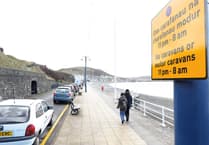Of twin Welsh government initiatives aimed at making it easier for people to buy and rent in their home towns and villages, one will certainly succeed. The other is problematic.
The success story is going to be the £50m national empty homes grant scheme launched earlier this year, which offers up to £25,000 per building to pay for improvements to bring places back into circulation.
This strategy is operated on the government’s behalf by Rhondda Cynon Taf council, which has brought 922 empty homes back into use, through this and other schemes, since 2017.
But its benefits spread to rural west Wales. In Gwynedd, where local people are routinely and depressingly priced out of the housing market, the council has intervened to itself buy houses that are then affordably rented to local people. In addition, through the empty homes scheme, 116 individuals - at the last count – have been able to bring 50 empty houses in the county back into use.
Less clear-cut in certainty of benefit are evolving radical measures giving councils in Wales extra powers designed to stop a preponderance of second homes gouging the life out of too many rural, and particularly coastal, parts of the country. Councils are now busy exercising new, and newish, powers to dramatically increase the amount of council tax that second-home owners must pay.
But they will also be able to bring in changes to planning rules to make it harder for houses and flats to be bought as holiday retreats. Three new planning use classes – primary home; second home; short-term holiday accommodation - mean councils will be able to amend the planning system to require change-of-use consent from one class to another.
In Ceredigion, a report following public consultation recommends a 100 per cent council tax premium on second homes from April next year, with a second rise to 150 per cent in April 2025.
Just under 1,700 properties in the county – out of a total of 33,856 – are second homes, most being on the coast. New Quay accounts for 27.2 per cent of the total, followed by Llangrannog, Borth, Pontarfynach, Penbryn, Aberaeron and Aberporth.
So what’s the theory? A second-home owner rebels over the council tax premium and decides to sell up. Do they pitch the asking price at an amount affordable to a first-time buyer living locally, or rebel for a second time and keep it high? Somehow, this second seems more likely, especially if the owner feels indignant at being eased out.
Will this leave the house empty - and completely wasted? Will it eventually be bought by another rich weekender from outside Wales? Certainly, any spending by occasional occupants will in the meantime be lost to local economies.
Will the house in question be snapped up by someone intending to rent it out as a holiday home at £900 or more a week, more at bank holidays (destructive dogs welcome)? Unless they’re clobbered by the new change-of-use consent rule, they’ll just tack punitive tax premiums onto the rent.
So, much uncertainty about whether stinging the rich will free up houses desperately needed by the poor.



